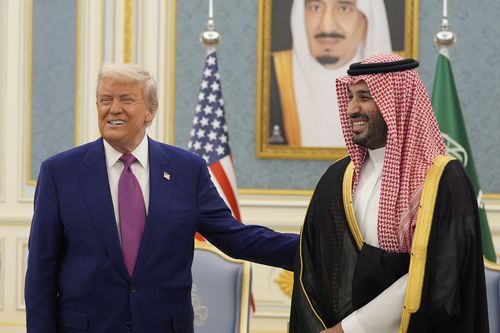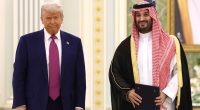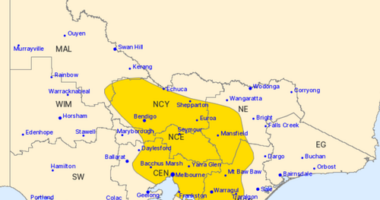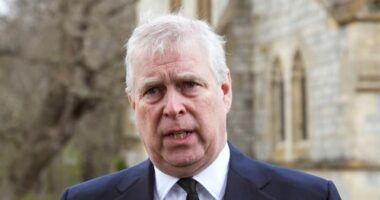Share this @internewscast.com
US President Donald Trump commenced a four-day Middle East visit on Tuesday in Saudi Arabia, focusing on securing economic deals with a vital Middle East partner, while underlying issues such as Iran’s nuclear activities and the Gaza conflict linger in the background.
Saudi Arabia’s de facto leader, Crown Prince Mohammed bin Salman, warmly welcomed Trump as he disembarked Air Force One at King Khalid International Airport in Riyadh, marking the start of his Middle East journey.
The leaders then proceeded to a grand hall at the airport, where Trump and his team were served traditional Arabic coffee by attendants dressed in ceremonial attire, complete with gun-belts.

The administration didn’t notify Israel — which the Houthis continue to target — of the agreement before Trump publicly announced it. It was the latest example of Trump leaving the Israelis in the dark about his administration’s negotiations with common adversaries.
In March, Israeli Prime Minister Benjamin Netanyahu wasn’t notified by the administration until after talks began with Hamas about the war in Gaza. And Netanyahu found out about the ongoing US nuclear talks with Iran only when Trump announced them during an Oval Office visit by the Israeli leader last month.
“Israel will defend itself by itself,” Netanyahu said last week following Trump’s Houthi truce announcement. “If others join us — our American friends — all the better.”
William Wechsler, senior director of the Rafik Hariri Center and Middle East Programs at the Atlantic Council, said Trump’s decision to skip Israel on his first Middle East visit is remarkable.
“The main message coming out of this, at least as the itinerary stands today, is that the governments of the Gulf … are in fact stronger friends to President Trump than the current government of Israel at this moment,” Wechsler said.
Restarting efforts to normalise Israel-Saudi ties
Trump, meanwhile, hopes to restart his first-term effort to normalise relations between the Middle East’s major powers, Israel and Saudi Arabia. Trump’s Abraham Accords effort led to Sudan, the UAE, Bahrain and Morocco agreeing to normalize relations with Israel.
But Riyadh has made clear that in exchange for normalization it wants US security guarantees, assistance with the kingdom’s nuclear program and progress on a pathway to Palestinian statehood. There seems to be scant hope for making headway on a Palestinian state with the Israel-Hamas war raging and the Israelis threatening to flatten and occupy Gaza.
Prince Mohammed last week notably hosted Palestinian Vice President Hussein al-Sheikh in Jeddah on the official’s first foreign visit since assuming office in April.
Hussain Abdul-Hussain, a research fellow at the Foundation for Defense of Democracies, said the crown prince appeared to be subtly signaling to Trump that the kingdom needs to see progress on Palestinian statehood for the Saudis to begin seriously moving on a normalisation deal with the Israelis.
“Knowing how the Saudis telegraph their intentions, that’s a preemptive, ‘Don’t even think of asking us to show any goodwill toward normalization,'” Abdul-Hussain said.











